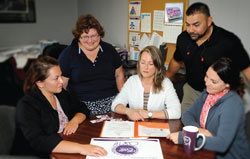They read almost like ads in the personals: Students “yearning” for real-life experience to complement their classroom learning. Local organizations “desperately seeking” new ideas to help them grow and improve.
 Dr. Susan McNamara of the School of Business works with Business Management major and student intern Caitlin Lynch, ’12 (seated, left), and members of the Cott Beverages marketing team. |
The School of Business’ capstone courses have become the proverbial coffee shop where both can meet and start something special.
Under the leadership of Dean Russell Boisjoly and Department of Business Administration Chair Mojtaba Seyedian, the School of Business is increasingly committed to service learning and community involvement.
Capstones allow students to integrate knowledge gained in marketing, finance and accounting with real-life situations — and make a tangible impact on the community while they are at it.
“Students have an opportunity to learn how classic strategy models work in the real world and build the skills they need to succeed after graduation,” said Dr. Susan McNamara, who leads the strategic management capstone. “In return, the businesses receive energy, creativity and talent from the student teams.”
Dr. McNamara’s initial section is devoted to strategic management of one’s career. From there, 30 students work collectively on a “mini analysis” of a business client. They learn techniques in market research, lean management and business analysis, and then apply them in a professional situation. That prepares the five-person teams to develop detailed plans to address client needs or concerns.
The demands on students are considerable. They must understand the vision, mission and goals of the organization, and learn about its competitive environment and the various industry sectors that affect it through analyses and market research.
One assignment included outlining steps to help market Cott Beverages (formerly Cliffstar Corp.), and recruit and retain employees. Student recommendations to engage a marketing communication agency, increase internal communication and distribute product samples are “already in the works” at Cott.
“This was a way for our company to work with the community, receive fresh ideas and perspectives to help our business grow, and increase the pipeline of potential future leaders,” said Cott spokesperson Jennifer Davis.
Branding, corporate awareness and outreach for future employees were goals of WCA Services Corp. Executive Director David Thomas said student input will be synthesized into a project and then expanded. Their recommendation to reach out to schools for future emergency responders was “spot on,” Thomas said, and rebranding ideas “hit the nail on the head.”
Applying its existing branding to a marketing strategy to engage 16 to 30 year-olds was the goal of the United Way of Northern Chautauqua County. Executive Director Deborah Tederous said an educational component that uses SUNY Fredonia students to mentor high school students from Chautauqua Striders is being developed as a result.
A ringing endorsement came from DFT Communications, which has participated three times. Each year, DFT offers students from the consulting internship opportunities the following semester to implement the recommendations their team developed.
Over 25 local businesses, including manufacturing, retail, food/business, technology, advertising, health care and tourism, have worked with students, as have non-profits such as Brooks Memorial Hospital, the Arts Incubator and the Dunkirk Historical Museum.
Capstones also create invaluable networking opportunities for students, including Caitlin Lynch (’12, Business Management), who obtained a summer internship at Cott Beverages. “My experience at Fredonia has taught me to be confident and motivated, as success is earned through hard work,” Lynch said. “This overall experience will be so valuable to me in any future position.”
Jennifer Zelasko (’12, Marketing) said interacting and working with real business clients were important skills she learned. “Being able to target what the main problem is, and find realistic solutions, is an important skill to have in any career path,” she added.
Dr. McNamara is ideally suited to coordinate the capstone experience. She previously directed the Workforce Investment Board, which assists businesses in economic development and matches workers with employers.
“I’m in the community. I know the professionals — the CEOs who value student input and love working with Fredonia students,” she said. “Listening to our local business leaders’ challenges and goals offers the opportunity to specifically match them with students with the appropriate skills and interests. It’s like an eHarmony kind of thing.”
And the School of Business intends to keep playing Cupid for many years to come.



